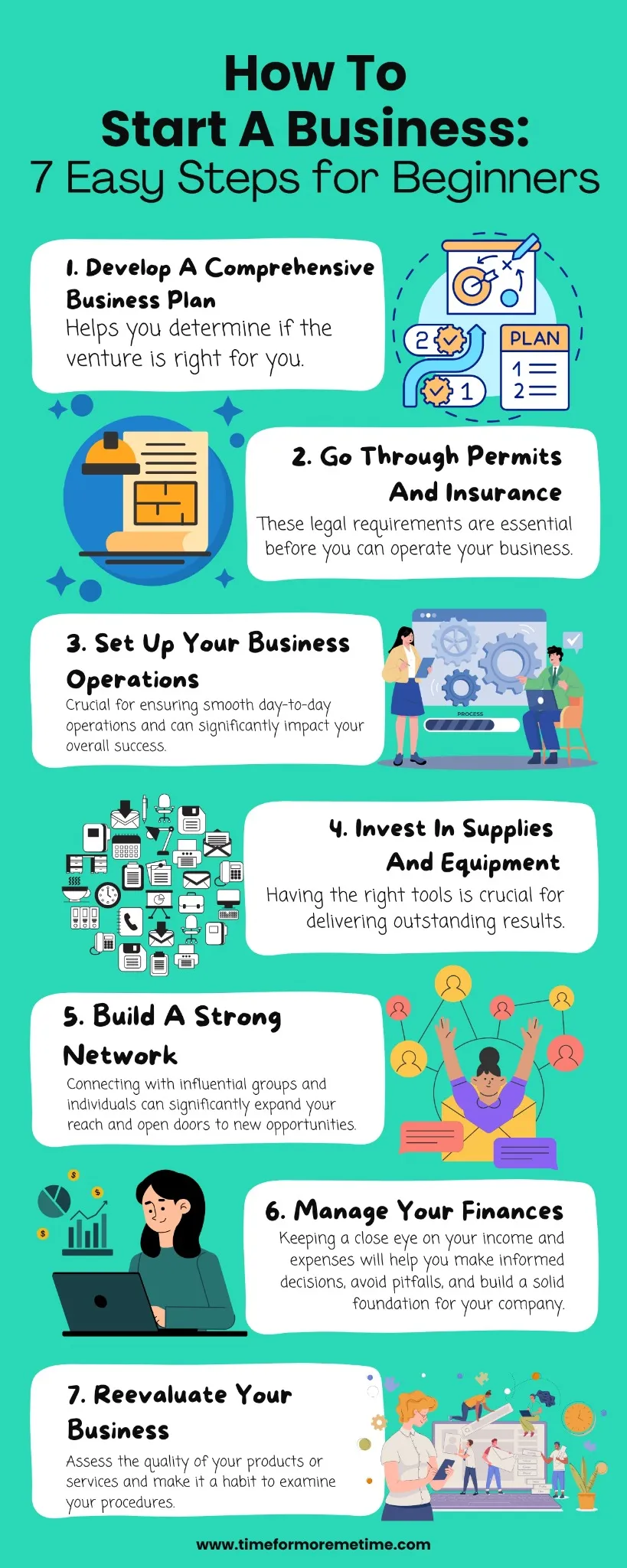
They say that business can lead to financial security and personal fulfillment. But which business should you pursue? These days, venturing into a field related to your current career is a wise choice when learning how to start a business successfully.
However, it’s important to recognize that starting a business is a challenging endeavor. I attempted to establish one myself.
After extensive reading, research, and interviews, I ultimately decided against it.
The business I wanted to start had significant costs, and I wasn’t ready to commit to it full-time. Instead of launching my own venture, I chose to work in a similar field as an employee. Hence, I’m working two jobs right now.
While it may seem disappointing, I believe it was a smart decision. Some business ideas simply aren’t a good fit for everyone.
Rather than diving into a high-stakes venture, I opted for a safer route that still aligns with my interests. This brings me to my current project: a website. Although it isn’t a fully-fledged business yet, I am in the process of building it.
I don’t want to waste the knowledge I’ve gained from my attempts at starting a business. So here I am, ready to share that insight. Most businesses follow similar steps, and in my case, I was prepared to tackle them.
The only obstacles were the capital required and the time commitment needed.
Now, without further ado, let’s get started!
1. Develop A Comprehensive Business Plan

A business plan is where it all begins. After all, a business without a plan is at a higher risk of failure, even if it’s just a side venture. Without a solid plan, what will guide your decisions or steer your company toward success?
Having a well-thought-out plan provides clarity and focus. By considering every aspect of your business, you can refine your vision and identify potential roadblocks.
If you’re learning how to start a business, crafting a detailed plan ensures that you’re prepared for both challenges and opportunities along the way.
In many cases, developing a business plan helps you determine if the venture is right for you. For me, this process revealed that my initial idea was not feasible, as I carefully evaluated my time and financial capacity.
Even though my comprehensive business plan could help me secure funding, I realized that the potential risks and the commitment required to meet investors’ expectations were daunting.
From a financial perspective, your plan can help you project startup costs, ongoing expenses, and potential revenue. All of these elements are crucial for securing funding and ensuring profitability.
While your business plan should be tailored to your specific venture, you can follow a general structure. It should include the following components:
- Executive Summary: Provide a concise overview of your goals and unique selling points.
- Company Description: Detail your services, target market, and competitive advantage.
- Market Analysis: Include research on customer needs, competitor analysis, and insights into the local market.
- Marketing Strategy: Outline how you plan to attract clients, including advertising and promotions, as well as your pricing strategy.
- Management Team: Highlight your team’s qualifications and experience to build trust with potential investors.
- Financial Projections: Estimate your startup costs, operational expenses, and projected revenue over a specific period.
- Operational Plan: Describe the day-to-day operations of your business, including location, equipment, and staffing needs. This section helps clarify how you will deliver your services and manage your resources effectively.
While developing your business plan, be sure to also address your business structure, pricing, marketing strategy, base of operations, and staffing concerns. These elements are essential to establish as you learn how to start a business.
I will surely discuss everything I said in a separate post in the future. Stay tuned!
Anyway, remember, your business plan is a living document and a dynamic blueprint for your venture. It shouldn’t be set in stone; instead, it should be adaptable to market changes as your business grows and trends evolve.
While the plan serves as a guide, it’s important to revise it regularly to make data-driven decisions about marketing, pricing, and expansion.
However, avoid getting stuck in analysis paralysis. Don’t spend a year solely planning and developing your business plan. You don’t need to include every detail, such as what lunch you’ll serve yourself while working.
For example, if you’re aiming for a small and simple business, like mowing lawns as a solo contractor, you can skip some details that may not apply. Is it really necessary to discuss a management team if you’re a one- or two-person operation?
Ultimately, the main goal of your business plan is to gather the necessary information to get your business up and running.
In many cases, you may not even need it to secure investments, as some entrepreneurs fund their ventures out of pocket. Additionally, some banks may be lenient with the details required for small loans.
2. Go Through Permits And Insurance
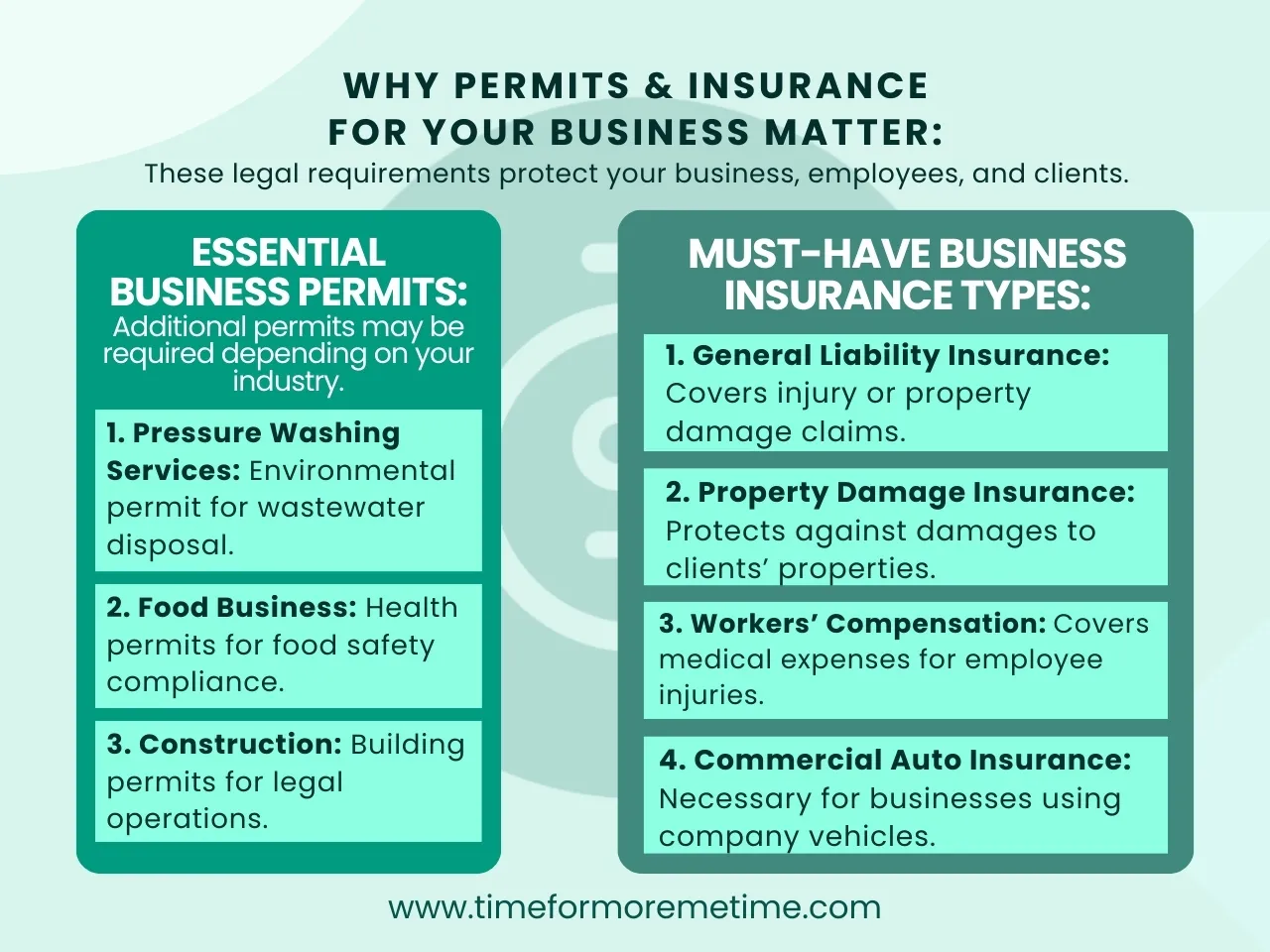
Once you have a business plan and secured funding for the business, it’s time to acquire the necessary licenses, permits, and insurance. These legal requirements are essential before you can operate your business.
You can obtain a business license from your county or city before starting operations. In addition to a general business license, you may need special permits.
For example, if you plan to offer pressure washing services, you will likely need an environmental permit for wastewater disposal.
Insurance is also a must for any business owner, and you may need more than one type. This is especially critical if you plan to hire employees who will be working in physical jobs.
If your crew or anyone else gets injured on a job site or if you accidentally damage a client’s property, you could face a lawsuit. To protect yourself, it’s wise to have general liability insurance.
Additionally, consider including property damage coverage in your policy, as your business involves working in clients’ homes or offices.
Another thing you should have is workers’ compensation insurance. Furthermore, if your employees will be driving company vehicles, commercial auto insurance is necessary to cover vehicle-related expenses.
Are you feeling the massive amounts of financial strain a business can cause? Well, I did when I was still drafting my business plan. Unfortunately, insurance can seem like an unnecessary expense when you’re just starting out.
However, would you prefer to have peace of mind or deal with liabilities when accidents occur?
3. Set Up Your Business Operations
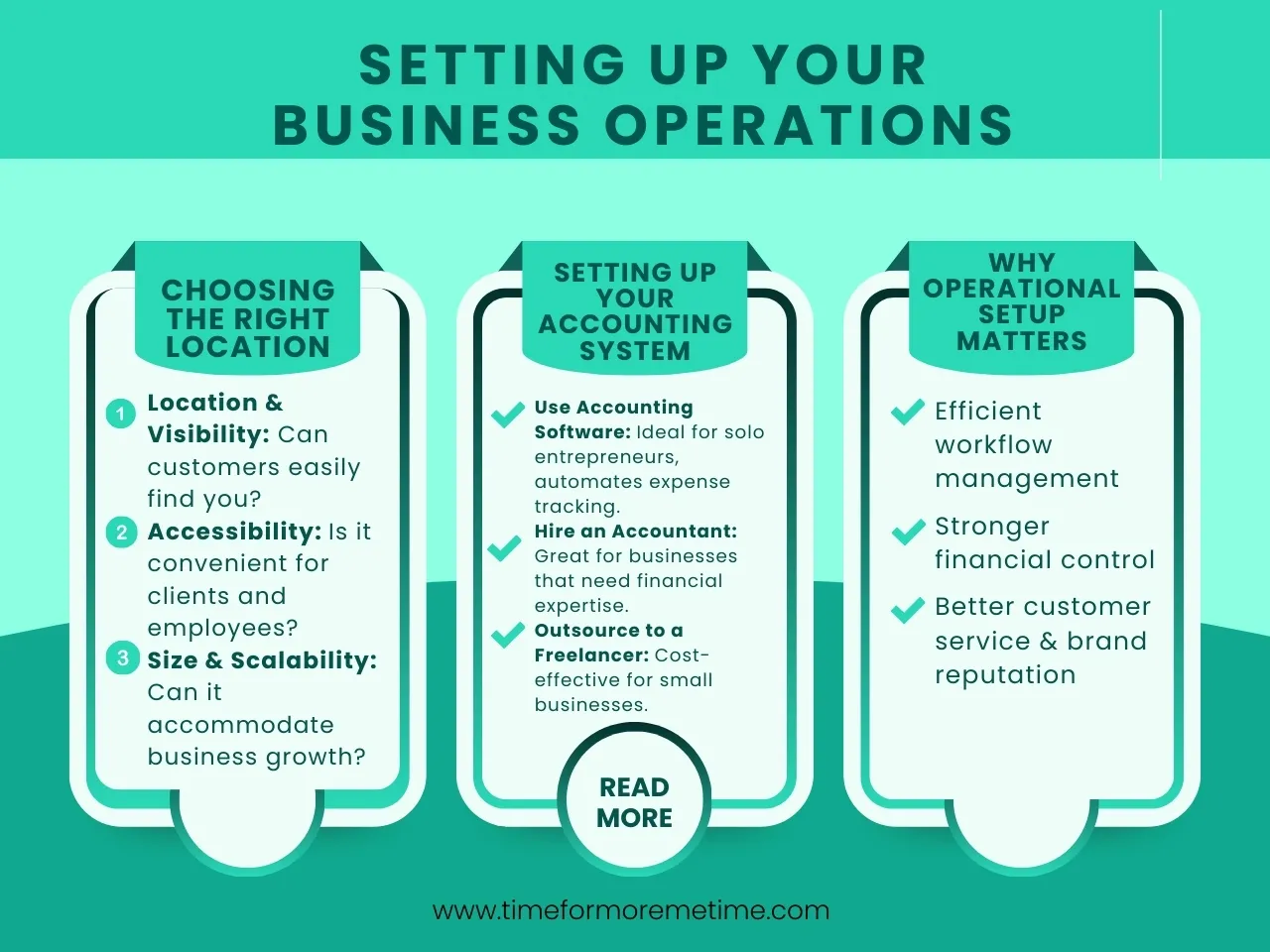
Your base of operations is the core of your business, and it will vary depending on the type of business you are establishing.
This foundational element is crucial for ensuring smooth day-to-day operations and can significantly impact your overall success.
For most traditional businesses, having a physical office or store is essential. This space not only serves as a location for conducting business but also provides a professional environment for meeting clients and customers.
Consider factors such as location, accessibility, and size when choosing your physical space. A well-chosen location can enhance visibility and attract more customers.
In addition to your base of operations, you also need to set up your accounting system. There are several ways to do this. If you’re going solo, consider using accounting software to simplify the complexities of managing your business finances.
Alternatively, you can hire an accountant. If you can’t afford a full-time hire or your business is too small, you can always opt for a freelance accountant to help manage your books.
4. Invest In Supplies And Equipment
Once you have all the legalities in place and your base of operations ready, it’s time to invest in your supplies and equipment.
The amount you need to spend will depend on the type of business you’re establishing but don’t skimp on this essential step. Having the right tools is crucial for delivering outstanding results.
That said, you don’t need to buy everything, including extravagant items like a futuristic egg chair and lava lamp for your office. Focus on the essential tools required to run your business effectively.
For now, set aside accounting and marketing software, as well as any unnecessary bells and whistles.
Having the right supplies and tools increases your chances of delivering exceptional results. These results are crucial for building a strong reputation—something that is vital for startups.
A solid reputation will enable you to compete effectively with others in your field.
Once you establish a steady stream of clients and customers, you can reconsider investing in additional tools and equipment that will further enhance your business.
5. Build A Strong Network
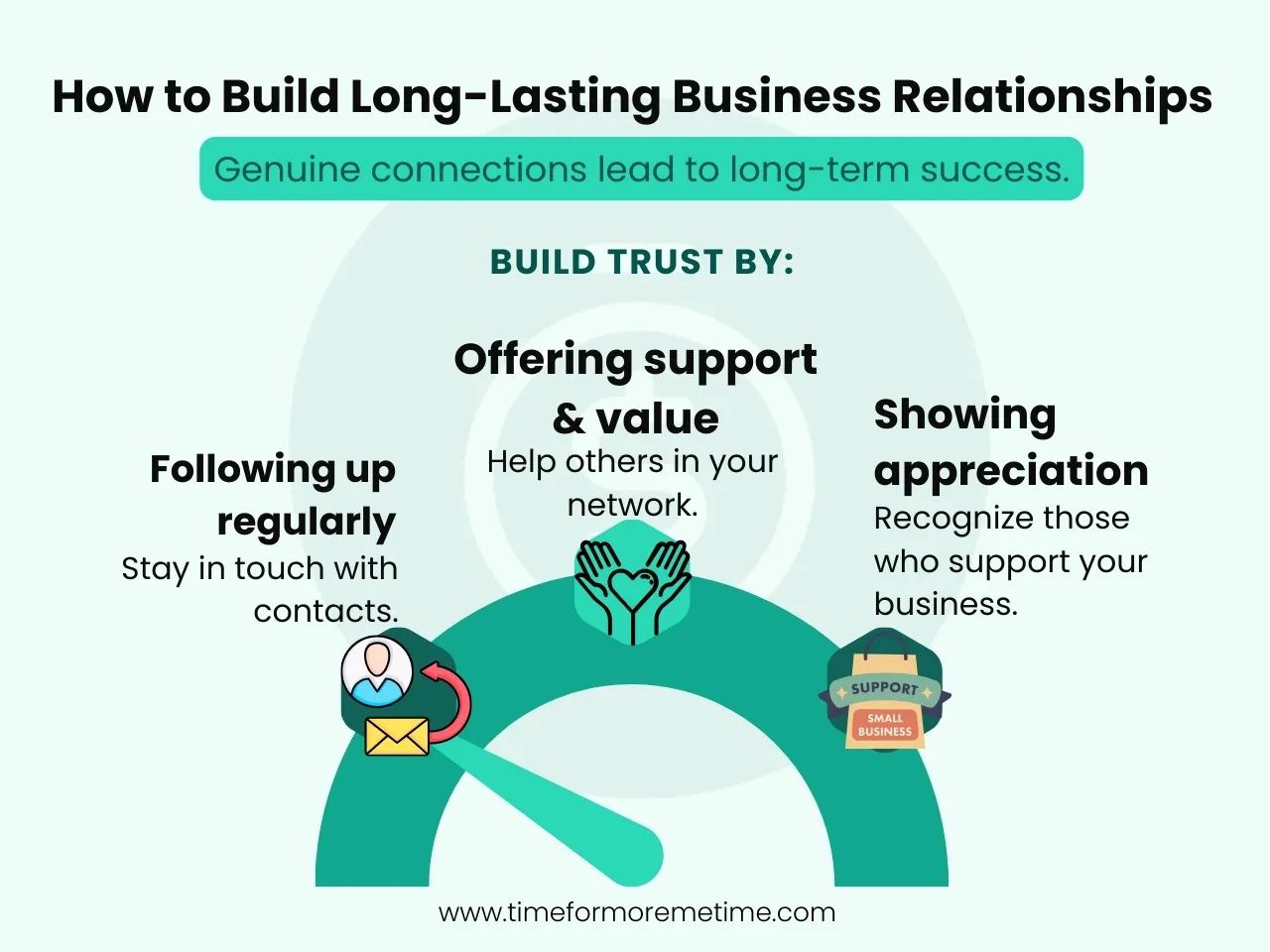
Building a strong network and maintaining a robust online presence are essential and ongoing tasks for any business owner. As you learn how to start a business, consider multiple strategies to establish and grow your brand effectively.
One effective approach is to invest in search engine optimization (SEO) for your website.
By optimizing your site for search engines, you can improve its visibility and attract more visitors. This involves using relevant keywords, creating high-quality content, and ensuring your website is user-friendly.
Hiring an SEO expert can help you navigate these complexities and develop a strategy tailored to your business needs.
In addition to optimizing your website, setting up and maintaining your business directory accounts is crucial.
Ensure that your business information is accurate and consistent across platforms like Google My Business, Yelp, and other local directories.
This not only helps potential customers find you but also enhances your credibility and improves your search engine rankings.
Networking is another vital component of building a strong presence in your industry. Connecting with influential groups and individuals can significantly expand your reach and open doors to new opportunities.
Here are simple ways to do this:
- Attend industry events, conferences, and trade shows to meet potential partners, clients, and mentors.
- Engaging in local business organizations or chambers of commerce can also provide valuable networking opportunities.
- Social media is another powerful tool for building your network. Platforms like LinkedIn, Facebook, Instagram, and Twitter allow you to connect with others in your industry, share your expertise, and promote your business.
Regularly posting valuable content, engaging with your audience, and participating in relevant discussions can help you establish yourself as a thought leader in your field.
Consider joining online forums or groups related to your industry. Participating in discussions and offering insights can help you build relationships with others who share your interests and goals.
These connections can lead to collaborations, referrals, and valuable advice.
Finally, don’t underestimate the power of personal relationships. Building genuine connections with clients, suppliers, and other business owners can lead to long-lasting partnerships.
Take the time to nurture these relationships by following up, offering assistance, and showing appreciation for their support.
6. Manage Your Finances

Rocking a successful business is all about juggling multiple balls at once. And none are more important than your finances.
Keeping a close eye on your income and expenses will help you make informed decisions, avoid pitfalls, and build a solid foundation for your company.
When you know where the money is going, you’ll have a good idea whether you need some extra cash to cover some costs. It also gives you a signal if you need to apply for a business loan or line of credit.
When doing so, choose carefully—shop around for the best rates and terms.
And, of course, the golden rule: only borrow what you can realistically afford to pay back.
The key to financial organization is keeping track of all your expenses, big or small. From affordable household items like cleaning supplies to more substantial expenses like gas for your vehicle, every payment adds up.
By staying on top of your spending, you can breeze through tax season with confidence and even take advantage of specific upfront costs as deductions.
Another is to set aside money for taxes throughout the year so you’re not scrambling come April. As a small business owner, you’ll likely need to pay estimated quarterly taxes.
A good rule of thumb is to set aside 25-30% of your income from your company.
To ensure you’re saving and not accidentally spending your gains, opening a dedicated bank account and credit card is essential. Large or small businesses need this separation of finances to make it much easier to track income and expenses.
7. Reevaluate Your Business
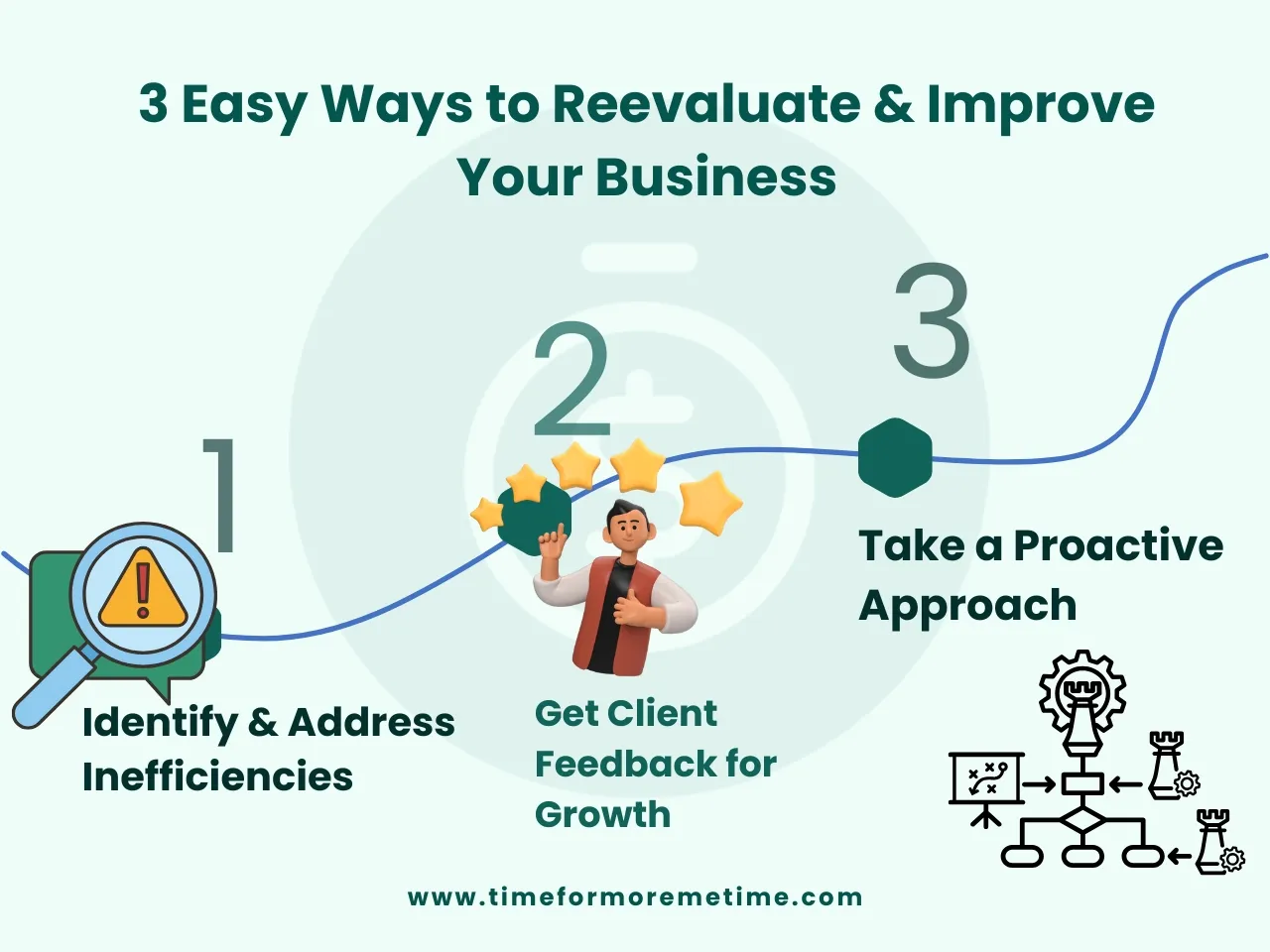
Finally, it’s essential to regularly reevaluate your business. As you navigate how to start a business, assess the quality of your products or services and make it a habit to examine your procedures.
Identify inefficiencies and find ways to streamline your business. Look for opportunities for improvement.
By pinpointing these areas of concern, you can implement small but impactful changes that enhance your daily operations. For example, could booking software help reduce the monotony of paperwork?
If so, consider implementing such tools to improve efficiency.
While these changes may incur upfront costs, they will ultimately make your business more efficient and profitable over time.
To gauge how your employees are performing, consider seeking feedback from your clients. Their insights can help you determine whether your team needs additional training or if it’s time to hire new staff.
A business thrives when clients are satisfied, so their feedback is invaluable.
When you understand how your crew is doing, you’ll know what adjustments to make and when to make them. This proactive approach will help you retain loyal clients and potentially attract new ones, ensuring the continued growth and success of your business.
FAQs
I know you need more information despite my lengthy post, so here’s the FAQ section. Feel free to dive in!
What technology tools can help starting a business?
If you’re planning a small business and learning how to start a business, I don’t recommend getting all of these tools right away. However, if you have the budget, definitely consider investing in accounting, project management, and customer relationship management (CRM) software.
These are the top three tech tools that can help you build your business from the ground up and support your growth as you expand.
How often should I reevaluate my business plan and strategies?
While I’d love to say you should reevaluate all the time, that’s not realistic. It’s more efficient to reassess after major milestones, changes in financial performance, and shifts in market conditions.
Reevaluating your business during or after these moments will help you understand the business climate and ensure you stay on track, preventing potential setbacks.
What are the common mistakes to avoid when starting a business?
There are several common pitfalls to watch out for. First and foremost is the lack of a solid business plan. Next, many entrepreneurs underestimate startup costs—I’ve seen this happen with some of my friends. Additionally, setting unrealistic goals can be detrimental.
Remember, building a business is a slow process, and you may not see a return on investment in the first or even second year. Starting a business involves risks, so it’s important to be prepared.
Conclusion
A successful business doesn’t just appear out of nowhere. Business owners often start with small ventures and work hard to grow them into thriving companies. This journey of how to start a business can be challenging, but it’s also incredibly rewarding.
By following the steps outlined in this guide, you’ll be well on your way to building a successful and profitable business. Remember, the key to success lies in providing exceptional service, building a strong reputation, and continually adapting to your clients’ changing needs.
Want more real-life, experience-based tips on growing your income? Subscribe to my YouTube channel, @timeformoremetime, for in-depth guides and insights!
Follow my page and visit my website for more valuable resources to help you succeed in your entrepreneurial journey. Let’s make your business dreams a reality!






